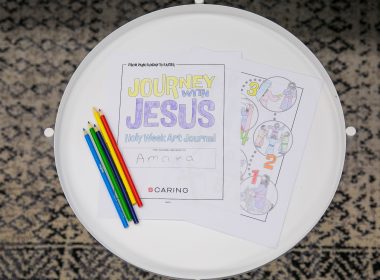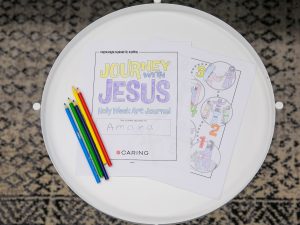A Scripture study from Caring.
Have you ever had a moment when you thought you understood something well and then God challenged your knowledge?
I thought I understood God’s joy and then God instilled a calling for my husband and I to foster-adopt.
We always felt called to foster-adopt but we never imagined doing so based on our inability to have biological children. Our knowledge of joy was challenged: Were we emotionally healthy enough to take on kids let alone share that same joy?
As we followed a plan to become certified foster parents, our notion of joy was refreshed by an instructor known as a seasoned social worker by day and a foster “mama bear” by night. The first words out of her mouth were: “Brokenness happens in the context of community.”
There was a long uncomfortable pause.
I remember thinking, “I’m not caffeinated enough for this, and if that was meant to inspire confidence, it’s going to be a long night.”
But the pause was mercifully punctuated by, “And so does healing.”
This well-known mama bear of the foster system dived into a lecture that taught me more about joy than any sermon or university class ever did. She explained that our role as a primary care provider is to establish trust.
In trauma informed care, trust is established by creating an attachment to a primary care giver. That attachment is the healthy community that can restore what has been broken. Care givers build trust by providing safety and being a stable presence. Circumstance should not cause or be a justification for care givers, as the instructor put it, “to be knocked off your square.”
Yelling, for example, is reserved for safety and not a tool used to belittle. The voice of the trusted one is heard above the chaos causing action. A child can hear, “Get out of the street; a car is coming!” from someone who has given them healing because the child has established that person is worthy of trust.
A child who has a healthy attachment to their people is better equipped to navigate adversity, knows they can lean into their person, and has a relationship that celebrates their wins and who they are.
An emotionally regulated primary care provider can give a child who has experienced trauma the knowledge of true joy.
I sat in awe when I realized for the first time that the joy of the Lord also holds community, trust, restoration and celebration in tandem. When we lean into our relationship with the Lord, he gifts us with joy that we can gift to others.
Read Psalm 43.
In Psalm 43, David is emotionally defeated by his circumstances and he is processing. David wants to be rescued. He is frustrated because people are lying to him and about him. In the loudness of the world around him, he is wondering if God has rejected him.
David is asking himself, “Where is God in the chaos?”
We see an atmospheric transition as David leans into the presence of his trusted one despite the oppression swirling around him. David names the Lord El Simchah Gili—God my Exceeding Joy.
Reflect on Psalm 43:4:
Then I will go to the altar of God,
to God, my joy and my delight.
I will praise you with the lyre,
O God, my God.
The community that comes with having a trusted relationship with the Lord brought restoration to the fractured places of David’s world.
A new phase
The word the angels use for joy at the proclamation of the birth of Christ is recorded as the Greek word chara—a sustainable emotional state that is rooted in an individual with a high trust level in the Lord. An emotional state that is not swayed by favorable or unfavorable circumstances.
Read Luke 2:10-11:
But the angel said to them, “Do not be afraid. I bring you good news that will cause great joy for all the people. Today in the town of David a Savior has been born to you; he is the Messiah, the Lord.
The angels burst in celebration heralding God’s indwelling presence in community with his people.
The healthy attachment plan for God and his creation had entered a new phase, and that alone was worthy of celebration. God chose to be born into that which was broken because in his salvation community, there is healing.
The image of that seasoned social worker and mama bear has become a core memory for me, along with her words: “Healing happens in community.”
Joy and its friends—community, trust, restoration and celebration—are the witness a weary and broken world needs.
We can be trapped by what compromises our joy—threats (real, perceived or existential), unmet expectations, circumstances, relationships, wounds and more—or we can call out to the God of our Exceeding Joy.
Our attachment to the Lord shows us we are known.
Abiding in the presence of triune God is ultimate community.
We can cultivate joy in others through our connection with him.
Questions for reflection:
- If healing happens in community, what is yours?
- What is your experience of joy, community, trust, restoration and celebration?
- How do you abide in the presence of triune God?
Do Good:
- Get inside the Caring Magazine Scripture Study Collection and find a suite of free, downloadable Bible studies to guide you through topics from New Beginnings Through Forgiveness, to Understanding our Imago Dei or Life Hacks From David.
- Listen to Captain Arwyn Rodriguera discuss attachment theory and finding joy on the Do Gooders Podcast.
- Tell people who you are, what you’re passionate about and why you care. Find confidence, healing or simply the satisfaction of finding your voice, owning your story and sharing it with others. Sign up for our free email course and get started today.












